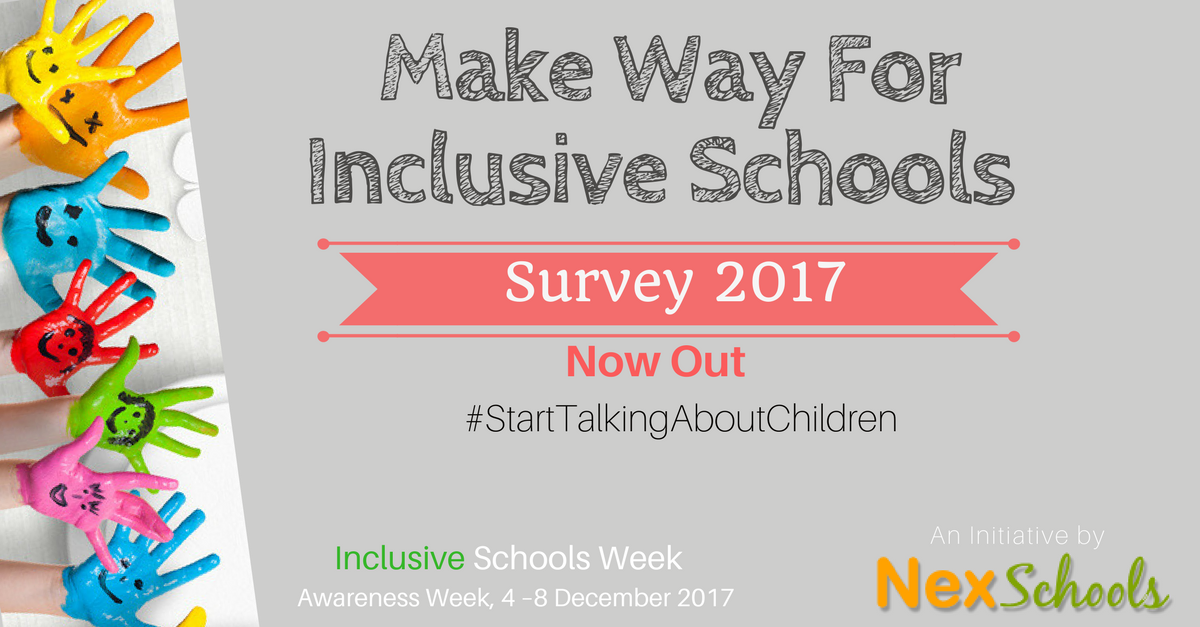
The aim of conducting Inclusive Education Week from 4-8 December 2017, commenced with an awareness campaign but as we started working towards it and delving deeper into the education system around inclusive education it became more significant and meaningful.
The Special Need Education and Inevitable Segregation
I suddenly realized after analyzing the findings of the survey from inclusive education that we are not considering here plight of the parents and children who are in dire need of Special Need Education that figure is whopping 26 million. These special need children are segregated and excluded is the stark reality of today. The funding challenges and high asking salaries of qualified and trained candidates force smaller segregated segments to proliferate and the parents with high income prefer these segregated segments.
The parents from low-income group lack knowledge and procedure to get the disability certificate also and their quandary is beyond expression. Obtaining the disability certificate is a laborious process, so even if there are benefits/concessions that can be availed related to travel, exams don't reach them.
Why are Schools so Important?
The poorer parents have lack of knowledge about disability; this makes them dependent on school administration and teachers. The more delay in the identification, the greater is the chance of exacerbated disability. In many cases, the schools are not adequately resourced for the child development need and to take on responsibility entirely.
In case of educated and middle income-group, parents can exercise more control over their child’s education and the onus of care doesn’t fall fully on the school.
Schools can create the positive attitude towards inclusion. No amount of awareness can change the attitude but when children at an early age are exposed to each other, see their unique strengths and weaknesses. They become friends and hold hand in peer support activities when they mingle with the diverse background, then they become better human beings, more tolerant as adults and probably more equipped to inclusion culturally and at workplaces. Schools are vehicles for creating inclusive ethos.
“A kindergarten class where a child sitting on his chair with quite a social problem pretended to cry and jump in between the class. A little boy moved next to him, kept his hand on his back, and left it there for some time. It was wonderful and he stopped and smile, he took his hand away that was it. It was all done when the teacher was taking the main teaching. Fantastic.” Says Preschool Founder Anvita Das this is how peer program in inclusive school works.
Inclusive Education Survey and Findings
We at NexSchools conducted a survey of the mainstream schools to analyze the inclusiveness of the schools. We reached out to 1000 schools and their heads and founders didn’t find any reason to participate in the survey of Inclusive Awareness Week.
Here are the findings from the survey:
-
50% respondents admitted that the selection of students for the admission from middle school onwards is based on the merit in academics of two or three subjects.
-
10% heads of the schools responded that the admission process from middle and in some cases from grade third onwards for school is a process of elimination. It is a way of filtering so as to attain 100% pass out results.
-
About 0.2% said the school is inclusive and we have profiled one such respondent based on the contributions they provided for inclusive education.
-
About 80% of the mainstream schools do not provide any kind of inclusive education to their children.
Source: NexSchools Survey 2017: Inclusive Schools
**The sample of the survey was from the urban areas Tier I cities, private English Medium Schools.
All the data was collected for Inclusive Education Week Awareness Campaign
The Mainstream School’s Perspective
Inclusion in mainstream schools also means:
-
Under no circumstances reject or filter students in higher classes for the sake of getting better results
-
Develop need-based programs with important role of teachers as facilitators to allow children to discover their own skills and work with them to catch up with peers
-
Focus on teacher’s training to be more sensitive to the needs of children who need little more attention, first generation learners and even physically disabled children.
A large number of children going to mainstream schools struggle in daily life, challenges they face every day in catching and coping up with the school education can be contemplated to some extent by the admission process of mainstream schools.
A real reform and significant progress in improving the quality and equity in Indian Schooling depend on tackling our deepest and the most stubborn educational challenges. Nevertheless, educators who until now didn’t think of inclusive schools and preschools are welcoming the idea and need to create an inclusive ethos in schools and preschools.
“Yes, I appreciate the initiative taken by NexSchools to attract and motivate educators to contribute to the welfare of society. Our preschool is in the foundation stage and soon we will start working towards inclusive classrooms.
A small effort from each school can significantly contribute to the development of a more inclusive society, it will add to more approachable learning centres for kids with special need in terms of affordability and distance. Therefore, it should be the prime focus of educators to partner with parents in letting their child become an independent individual. It is equally important to emphasis on the need for training of special teachers to implement it effectively.” Aparna Bedi Tiwari, Branch Head, Wow Kids, Bangalore
Obstacles to Inclusion in Mainstream Schools
Bringing everyone in the mainstream education is mandated in the National Education Policy of 1986 and subsequently in Sarva Shiksha Abhiyaan and Right to Education Act. These are all beautifully designed policies on the paper on the ground we see how mainstream schooling falling short even for non-disabled students poses a question.
Are the schools currently capable of supporting the inclusion of children with mild learning difficulties?
Some observations came out from the survey that added to the list of obstacles that doesn’t support mild learning difficulties among the children in our mainstream schools. These are some stubborn educational challenges that need urgent attention and speedy action by the school administration.
The Rigid Examination System

The reality is rigid nature of traditional system for testable standards of examination can’t withhold the inclusion of all the children. The good private schools are recognized by the examination and are much sought after. By the very design, private schools, particularly in the urban areas, are highly selective in their student demographics in order to position themselves in academic standards and public estimation. There is no evidence that special need children will add anything positive to the school’s standard, therefore, parents and administration both do not want to enroll the children with physical disabilities or even minor learning disabilities in mainstream schools.
Labelling Slow Learners in a Race to Complete Academics
The children who need little extra attention are labeled as slow learners. These children with minor learning difficulties have average and sometimes above average IQ, probably the structured and long hours of schools, lectures after lectures are not their learning style.
When a concept of mathematics is missed out in a class and with no extra help in their hands they fall behind in understanding addition, then multiplication and how is division possible without the previous concept building? This is how children lose interest in the school. For such children, the mainstream environment doesn’t have any space. They are sent to tuition classes and counseled but oversized classes and overburdened teachers do not understand the need of a child. Many children are struggling every day with the fundamentals and probably the reason for falling school learning outcomes.
IQ Testing Myth
In India testing children for their Intelligence Quotient (IQ) continues to be the measure for determining their special needs, labeling children deficient in some way, and predicting their future performances. There has been little thought given to branding children and labeling them has been a disaster for many children in the twentieth century and into the twenty-first century.
The goal of intelligence test, first developed in France by Binet was to plan for all children in school and not to segregate them.
Admission Policies by Private School
The private schools in India also segregate children for special need education by charging a separate fee, admission and assembly policy also differ. As in the private school, the admission is by selection on anonymity one head of the schools described it as, “actually a policy of elimination rather than selection because the number of applications is many and there are limited seats.”
Flexible Curriculum
We need to restructure our curriculum for all learning needs and all students. Flexibility and choice rather than race to complete the academics and then test by recall system.
In mainstream school, provision for an integrated curriculum for the visually impaired child for learning to read in Braille, for hearing impaired child to understand sign system that means translating into signs that we read and write can be developed as a policy of inclusion in the prescribed curriculum by the government.
Raising the Professional Status of Teachers
The most important challenge is to raise the professional status of teaching as a career choice, attract more able people into teaching and to develop teaching as the knowledge-based profession.
“Despite reforms, efforts, ongoing calls for change, progress in addressing some of the challenges is often slow and solutions continue to elude us.
It is not even that we do not know what the challenges are. However, their roots lie so deeply entrenched that educational systems and processes are difficult to change. Political will and intent are missing or only for quick wins.
Our mission is to do all we can to represent parents, teachers, thought leaders and even children’s voices in the dialogue, on how our children succeed in schools and community.
As we have stepped in this path, we ask for your voices, expertise, and engagement. We want to support you in the work you are doing and change the way we do education today.”- Mradula Singh, Founder, NexSchools Team For Change
Register as a school member
School Membership of NexSchools comes loaded with many free benefits, insights and  ideas
ideas